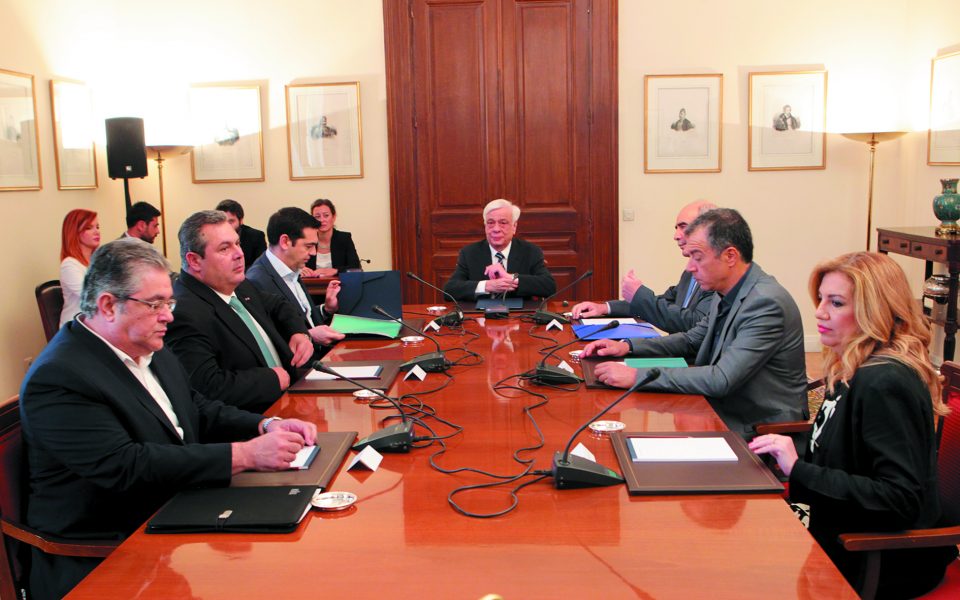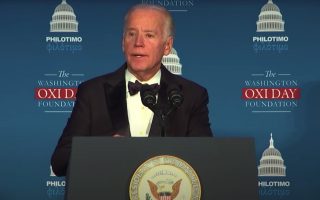The deadlock and the ultimate call to Putin
The day after the 2015 referendum on Greece's bailout accord, the Grexit drama peaked inside the Presidential Mansion in Athens

On Monday, July 6, 2015, a day after the bailout referendum in Greece, the Russian Embassy in Athens posted an official communication on its website, announcing that a telephone conversation had taken place between Russian President Vladimir Putin and Greek Prime Minister Alexis Tsipras upon the latter’s request.
The phone call has been underestimated in the density of the events, but new information reveals that it was Tsipras’ last attempt to discuss Greece’s future outside the eurozone. A little after 10 a.m., the premier was at the Presidential Mansion participating in the council of parliamentary leaders under the president of the Hellenic Republic, Prokopis Pavlopoulos.
It was officially communicated that Tsipras was the one who had requested the meeting, even though he had planned the initiative with the president, who had informed the PM that he would resign if the “no” vote resulted in an exit from the eurozone.
Tsipras arrived at the Presidential Mansion with Nikos Pappas and Panagiotis Lafazanis, two of his closest aides at the time. Lafazanis interrupted the council’s meeting a while later to inform the prime minister that his request for a telephone call with the Kremlin had been accepted, and that the Russian president was ready to speak to him. A parliamentary leader present at the meeting told Kathimerini, “I could see the excitement in Lafazanis’ eyes as he interrupted us to connect the PM to Putin.” Lafazanis, a veteran politician of the Left, finally had a chance to push Greece into the Russian sphere of influence.
Tsipras apologized and left the meeting. During the phone conversation that followed some say that the country’s future was on the line. Other sources confirm that Putin, who is in fact a philhellene and very careful, had at no moment decided to push Greece toward bankruptcy, nor to lead it to a new national divide.
Stavros Theodorakis, leader of the centrist Potami party, recently told Kathimerini that when Tsipras returned to the meeting, he said, “Putin can’t help us, but if we want, he can speak favorably of us to [German Chancellor Angela] Merkel.” Other leaders confirm this. One of those present said, “When Theodorakis and [then leader of New Democracy Vangelis] Meimarakis heard Tsipras say that, they burst out laughing.” Meimarakis had only a few hours previously picked up the mantle after the resignation of Antonis Samaras from the party’s leadership. Meimarakis told the PM, “Alexis, do you realize we are at a dead end?” According to this account of events, Tsipras, who had been troubled since the meeting had started and was disinclined to celebrate the “no” vote victory, began to realize the gravity of the situation.
One question has troubled Kathimerini and will continue to trouble future historians: Did Tsipras want Greece to leave the eurozone? If so, did he or did he not ask for Russia’s help? There is no answer, as Tsipras himself has a chameleon-like talent of adapting his profile and beliefs to changing situations and needs. Some hold that, to Tsipras, leaving the eurozone was neither a safe and stable choice (as Lafazanis believed) nor taboo (as Euclid Tsakalotos believed).
The Putin-Tsipras phone call is closely linked to the call between the Russian president and his French counterpart Francois Hollande which took place later that day. This was only revealed 16 months later in a book on Hollande’s years in office written by Le Monde journalists Gerard Davet and Fabrice Lhomme. According to “A President Should Not Say That: Secrets of Five Years in Office,” Putin told Hollande: “Greece asked us to print drachmas in Russia. I wanted to share this information with you because we do not want this to happen.”
Grexit and the drachma, the old Greek currency, are still taboo topics in Greece. However, all evidence points to the same reality: On July 6, 2015, Alexis Tsipras made one last attempt to override and ultimately leave Europe, and Vladimir Putin refused to help him.
Two months before the referendum vote, the PM believed that a deal with Russian gas company Gazprom could be the vehicle for receiving 5 billion dollars to secure cash flow, or to print a new national currency, or threaten to print a new national currency. He thought this bluff would make Germany agree to cut the Greek debt. Russia encouraged these hopes at first, aiming to send a warning to Berlin and Paris, which were pressuring Russia after the 2014 invasion of Crimea.
On June 19, 2015, Putin invited Tsipras to speak at the St Petersburg World Economic Forum. In his speech, Tsipras sent a message to Berlin, saying, “Greece is ready to sail to new seas.” Just 15 days later, the Russian president did not allow Greece to sail the Volga River, as it were. Analysts assert that had Russia helped Greece leave the eurozone, then that would have been seen as a major act of aggression against Europe, which Russia had no reason to do, especially as the Crimea issue was already being dealt with.
As soon as it became clear that the “no” vote would win the referendum, President Pavlopoulos called Hollande to promise him that a written statement signed by the parliamentary leaders would clearly declare that the result was not a “no” to Europe, merely a indication that Greece wanted a better deal. Until that moment, the interpretations of the “no” vote varied.
Tsipras asked during the campaign for a strong “no,” arguing that it would allow him to secure a better debt deal. He knew, however, that debt relief would hamper Greece’s fiscal stability as all future debts would also be seen as potentially eligible for relief, resulting in funds pouring out of the country and spreads growing. That is why Germany could never accept it, and why it interpreted a “no” vote as a vote to leave the eurozone. The French president promised to intervene.
It was then that Pavlopoulos called Tsipras to ask him to come to the Presidential Mansion and call for a council of parliamentary leaders. The PM arrived at the Presidential Mansion some time after midnight, after going to Syntagma Square to celebrate the “no” vote with his supporters. He was careful when he addressed the public: “My mandate is not one of collision with Europe, but one of renegotiation, under a stronger position.” Tsipras later informed the president that it was his will to receive the consent of all parliamentary leaders before he proceeded. The council’s announcement reflected this.
The meeting got off to a rough start, at 10 a.m. the next day. Panos Kammenos, whose party supported the government, said that the “no” vote had obliterated all those who wished Greece to be subjugated. Meimarakis tried to balance between criticizing the government and supporting the PM in the face of the upcoming rounds of negotiations. Fofi Gennimata, leader of PASOK, repeated her belief that Greece should remain inside the eurozone. Theodorakis, a passionate supporter of the “yes” vote, called for conciliation. Dimitris Koutsoumbas said that the Communist Party was against the EU, but added that he didn’t want to ruin the deal because “if you are inside Europe, this cannot be the way you leave.”
All leaders could tell that this was a historic meeting. One of the “yes” supporters said: “If there is no conciliation Greece may very well slide into anarchy and squalor. The people have had it. There is a great divide, and the two fronts will soon collide. We are on the brink of a civil war.” Another said, “You cannot continue on your present path unless you have helicopters ready.” Soon, the secretaries keeping minutes left the room. “Until that happened each was merely talking to their political base,” said one leader. At the same time, European Commission President Jean-Claude Juncker was in Brussels with European leaders preparing for the Merkel-Hollande meeting in Paris later that evening. At 12.45 p.m. President Pavlopoulos called President Hollande to inform him that the parliamentary leaders had reached a deal, agreeing to support the reopening of negotiations. Three-and-a-half years later, visiting Athens, President Emmanuel Macron praised Hollande’s efforts to keep Greece in Europe, saying, “This phone call was pivotal because it allowed us to restart negotiations.”





